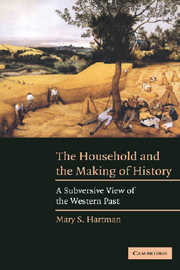Book contents
- Frontmatter
- Contents
- Preface and Acknowledgments
- 1 How Northwestern Europe Was Strange
- 2 Marrying Early and Marrying Late
- 3 The Riddle of the Western Family Pattern
- 4 The Women and Men of Montaillou and Salem Village
- 5 Communities in Crisis
- 6 What Men and Women Want
- 7 Interpreting the Western Past with the Women and the Households Left In, 1500–1800
- 8 The Late-Marriage Household, the Sexes, and the Modern World
- Epilogue
- Index
2 - Marrying Early and Marrying Late
Divergent and Parallel Lives
Published online by Cambridge University Press: 05 June 2012
- Frontmatter
- Contents
- Preface and Acknowledgments
- 1 How Northwestern Europe Was Strange
- 2 Marrying Early and Marrying Late
- 3 The Riddle of the Western Family Pattern
- 4 The Women and Men of Montaillou and Salem Village
- 5 Communities in Crisis
- 6 What Men and Women Want
- 7 Interpreting the Western Past with the Women and the Households Left In, 1500–1800
- 8 The Late-Marriage Household, the Sexes, and the Modern World
- Epilogue
- Index
Summary
In concluding Utopia (1516), his fantasy blueprint for a model society, Thomas More makes a sly disclaimer. He says that he hardly shares the enthusiasm for the island commonwealth of his imaginary narrator and interlocutor, Raphael Hythloday, who has just regaled him with the tale of an extended visit there. More further declares that many of the laws and customs of Utopia are ridiculous. “But I freely admit,” he adds in the very last words of his classic account, “that there are many features of the Utopian Republic which I should like – though I hardly expect – to see adopted in Europe.”
The precaution of putting his description of Utopia into the mouth of a fictitious visitor has long been understood. This was a time when expressing a subversive opinion could land a person in the Tower of London; and Thomas More, after all, was considering appointment to high office in Henry VIII's government at the time he was writing the book. Yet in all the controversy about what More actually thought about the features he invented for his island republic, modern commentators seldom tarry on the institution that he presents as the cornerstone of Utopian society: namely, a multifamily, multigenerational patriarchal household. Here is Hythloday's description:
Now I'd better explain their social arrangements – how society is organized, how they behave towards one another, how goods are distributed, and so on. Well, the smallest social unit is the household, which is virtually synonymous with the family. When a girl grows up and gets married, she joins her husband's household, but the boys of each generation stay at home, under the control of their oldest male relative – unless he becomes senile, in which case the next oldest takes over. […]
- Type
- Chapter
- Information
- The Household and the Making of HistoryA Subversive View of the Western Past, pp. 34 - 69Publisher: Cambridge University PressPrint publication year: 2004



